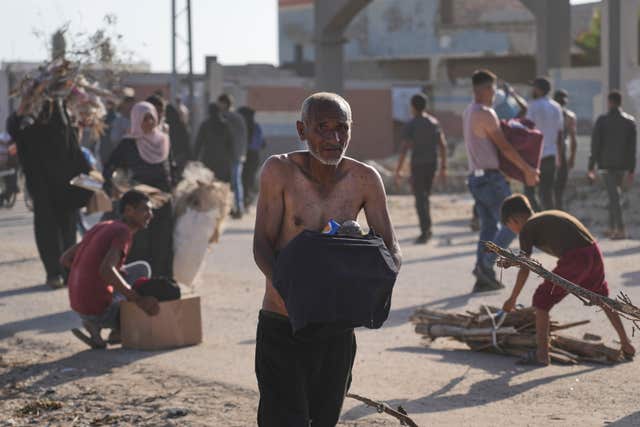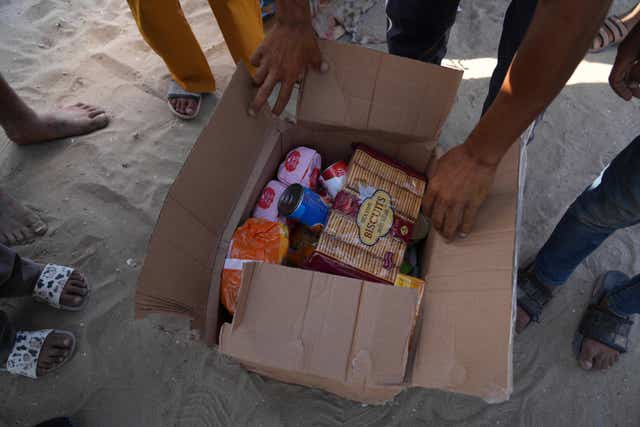Shots fired as US-backed humanitarian centre begins distributing food in Gaza
Israeli troops fired warning shots as Palestinians overwhelmed the centre in Rafah.

Chaos erupted on the second day of aid operations by a new US-backed group in Gaza as desperate Palestinians overwhelmed a centre distributing food on Tuesday, breaking through fences.
Nearby Israeli troops fired warning shots, sending people fleeing in panic.
An AP journalist heard Israeli tank and gunfire and saw a military helicopter firing flares.
The Israeli military said its troops fired the warning shots in the area outside the centre and that “control over the situation was established.”

At least three injured Palestinians were seen by the Associated Press being brought from the scene, one of them bleeding from his leg.
The distribution hub outside Gaza’s southernmost city of Rafah had been opened the day before by the Gaza Humanitarian Foundation (GHF), which has been tasked by Israel to take over aid operations.
The UN and other humanitarian organisations have rejected the new system, saying it will not be able to meet the needs of Gaza’s 2.3 million people and allows Israel to use food as a weapon to control the population.
They have also warned of the risk of friction between Israeli troops and people seeking supplies.

Palestinians have become desperate for food after nearly three months of Israeli blockade pushed Gaza to the brink of famine.
Palestinians at the scene told AP that small numbers of people made their way to the GHF centre on Tuesday morning and received food boxes.
As word spread, large numbers of men, women and children walked for several miles from the sprawling tent camps along Gaza’s Mediterranean coast. To reach the hub, they had to pass through nearby Israeli military positions.
By the afternoon, hundreds of thousands were massed at the hub. Videos show the crowds funnelled in long lines through chain-link fence passages.
Two people said each person was searched and had their faces scanned for identification before being allowed to receive the boxes.
Crowds swelled and turmoil erupted, with people tearing down fences and grabbing boxes. The staff at the site were forced to flee, they said.
An AP journalist positioned some distance away heard gunfire and rounds of tank fire. Smoke could be seen rising from where one round impacted. He saw a military helicopter overhead firing flares.
“There was no order, the people rushed to take, there was shooting, and we fled,” said Hosni Abu Amra, who had been waiting to receive aid. “We fled without taking anything that would help us get through this hunger.”
In a statement, GHF said that because of the large number of Palestinians seeking aid, staff at the hub followed the group’s safety protocols and “fell back” to allow them to dissipate, then later resumed operations.
A spokesperson for the group told the AP that no shots were fired from GHF. Speaking on condition of anonymity in line with the group’s rules, the spokesperson said the protocols aim at “avoiding loss of life, which is exactly what happened”.
GHF uses armed private contractors to guard the hubs and the transportation of supplies.
Israeli Prime Minister Benjamin Netanyahu on Tuesday commented on the turmoil at the Rafah centre, saying, “There was some loss of control momentarily … happily we brought it under control.”
He repeated that Israel plans to move Gaza’s entire population to a “sterile zone” at the southern end of the territory while troops fight Hamas elsewhere.
Israel has said the new system is necessary because it claims Hamas has been siphoning off supplies that reach Gaza. The UN has denied that any significant diversion takes place.
Cogat, the Israeli military agency in charge of co-ordinating aid, said on Tuesday that 400 trucks of supplies, mainly food, were waiting on the Gaza side of the main crossing from Israel, but that the UN had not collected them.
It said Israel has extended the times for collection and expanded the routes that the UN can use inside Gaza.
Jens Laerke, spokesperson for the UN humanitarian office OCHA, told reporters in Geneva that agencies have struggled to pick up the supplies “because of the insecure routes that are being assigned to us by the Israeli authorities to use.”
He said the amount of aid allowed the past week was “vastly insufficient”.





